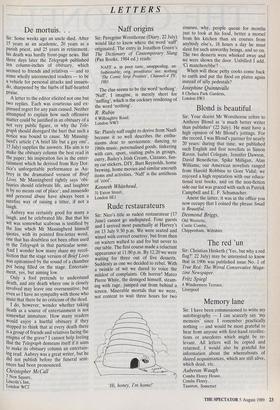LETTERS De mortuis. .
Sir: Some weeks ago an uncle died. After 15 years as an academic, 20 years as a parish priest, and 25 years in retirement, his death was hardly front-page news. But three days later the Telegraph published ten column-inches of obituary, which seemed to friends and relatives — and to some wholly unconnected readers — to be a vehicle for personal attacks and innuen- do, sharpened by the barbs of half-hearted praise.
A letter to the editor elicited not one but two replies. Each was courteous and ex- pressed regret for any pain caused. Neither attempted to explain how such offensive matter could be justified in an obituary of a not very public figure, or why the Tele- graph should disregard the hurt that such a notice was bound to cause. Mr Massing- berd's article CA brief life but a gay one', 15 July) supplies the answers. His aim is to make the obituary column the best read in the paper; his inspiration lies in the enter- tainment which he derived from Roy Dot- rice's unforgettable performance as Au- brey in the dramatised version of Brief Lives. Mr Massingberd rightly says 'obi- tuaries should celebrate life, and laughter is by no means out of place'; and innuendo and personal abuse have always been a surefire way of raising a titter, if not a laugh.
Aubrey was certainly good for many a laugh, and he celebrated life. But that his wit was somewhat scabrous is testified by the line which Mr Massingberd himself quotes, with its pointed five-letter word, one that has doubtless not been often used In the Telegraph in that particular sense. And I wonder how many share my recol- lection that the stage version of Brief Lives was epitomised by the sound of a chamber pot being filled on the stage. Entertain- ment, yes, but aiming low.
Only a fool pretends to understand death, and any death where one is closely involved may leave one oversensitive; but even so I have no sympathy with those who insist that there be no criticism of the dead.
I do, however, wonder whether taking death as a source of entertainment is not somewhat immature. How many readers would enjoy a hurtful obituary if they stopped to think that at every death there Is a group of friends and relatives facing the enigma of the grave? I cannot help feeling that the Telegraph demeans itself if it aims to make its obituary column an entertain- ing read. Aubrey was a great writer, but he did not publish before the funeral sent- ences had been pronounced.
Christopher McCall
7 New Square, Lincoln's Inn, London WC2


















































 Previous page
Previous page